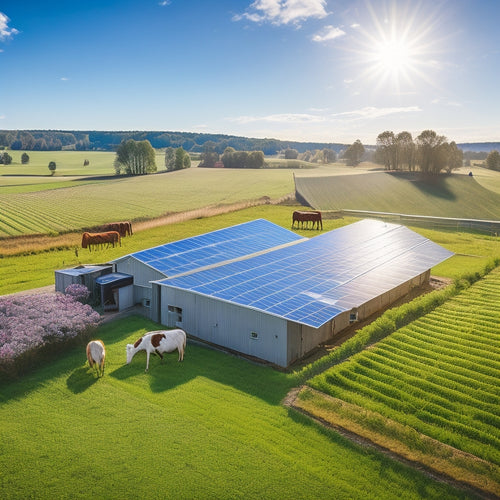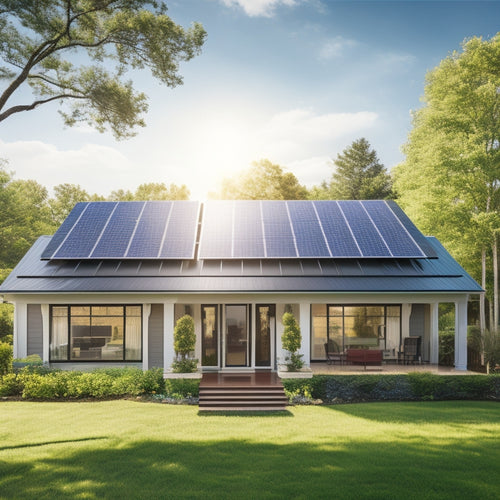
Residential Solar Panels
Share
By installing residential solar panels, you can greatly reduce your energy bills, possibly even eliminating them altogether. You'll not only save money but also increase your property value, making your home more attractive to eco-conscious buyers. With high-efficiency solar cells, you can maximize energy production and reduce your reliance on the grid. Before getting started, consider your roof's size, shape, and constraints to determine the best panel placement. And, don't forget to take advantage of government incentives, like the Federal Tax Credit, to offset the initial investment costs. As you delve into the world of residential solar panels, you'll uncover even more benefits that can change your home and your future.
The Essentials
- Residential solar panels can significantly reduce or eliminate energy bills, providing home energy independence and long-term savings.
- Solar panels increase property value, with studies indicating up to a 17% increase, making them a valuable investment for homeowners.
- High-efficiency solar cells maximize energy production, with ratings ranging from 15%-24%, and are critical for performance comparison and optimal energy output.
- Roof size, shape, and orientation impact solar panel placement, with ideal south-facing roofs receiving maximum sunlight and minimal shading.
- Government incentives, such as the Federal Tax Credit, offer up to 26% credit on total solar system cost, making residential solar panels a more accessible investment.
Zero Energy Bill Possibility
You can save money now by installing residential solar panels, which can considerably reduce your energy bills.
By investing in Home Energy Independence solutions, off-grid living you can minimize reliance on the grid and lower your energy bills.
With a well-designed solar panel system, you can achieve energy independence, generating enough electricity to power your home and potentially eliminating your energy bills altogether.
Save Money Now
By outfitting your home with residential solar panels, the possibility of a zero energy bill becomes a tangible reality, allowing homeowners to reap considerable financial benefits. You can save money now by reducing your reliance on the grid and generating your own clean energy.
With the advancements in Renewable Energy Solutions, homeowners can now enjoy a more sustainable and cost-effective way of powering their homes. By investing in solar panels, you'll be contributing to a cleaner environment and reducing your carbon footprint.
The initial investment in residential solar panels may seem intimidating, but it's crucial to reflect on the long-term savings. Installation costs are decreasing, and financing options are becoming more accessible, making it easier to get started.
Once your system is up and running, you'll start seeing the benefits on your energy bill.
With solar panels, you'll be generating free energy during the day, which can offset your energy consumption at night or during periods of low sunlight. This means you'll be paying considerably less to your utility company, or even nothing at all.
Energy Independence
Utilizing the power of residential solar panels opens the door to a significant change in your energy reliance, effectively freeing you from the grid's constraints.
You'll experience a new level of energy autonomy, where you're no longer bound by utility dependence. By utilizing the power of renewable resources, you'll reduce your environmental impact and contribute to a more sustainable future.
With the help of integrated solar solutions, such as an All in One Solar Power System, you can streamline your shift to renewable energy and guarantee a steady power supply even when the grid is down.
By integrating energy storage solutions with your solar technology, you'll be able to store excess energy generated during the day for use during the night or on cloudy days.
As you move towards energy independence, you'll notice a significant reduction in your energy bills, potentially even reaching zero.
This is made possible by the ability to generate your own clean energy, reducing your reliance on the grid and your utility bills.
Increases Property Value
You'll likely see a significant increase in your property's selling price if you install residential solar panels, as they're a highly sought-after feature among homebuyers.
In fact, studies have shown that solar panels can increase your property's value by up to 17%.
With the average price of residential solar panel systems decreasing, it's become more accessible to homeowners, offering affordable renewable energy solutions that can benefit the environment and your wallet.
Boosts Selling Price
Since homeowners first began adopting solar energy, a significant advantage has emerged: residential solar panels enhance selling prices and increase property value.
As you consider investing in solar panels, it's important to understand the impact on your property's resale value. According to solar market trends, homebuyers are willing to pay a premium for homes equipped with solar panels. In fact, studies have shown that solar panels can increase your home's selling price by up to 17%. This is because homebuyer preferences have shifted towards energy-efficient and eco-friendly homes.
As a homeowner, you'll benefit from increased property value, which can lead to a faster sale and higher profits. Additionally, solar panels can differentiate your property from others on the market, making it more attractive to potential buyers.
Long-Term Investment Value
As solar panels enhance your home's selling price, they also provide a long-term investment value that increases your property's worth over time. This is because solar panels offer a financial return through energy savings, which can be substantial over their 25-year or more lifespan.
With minimal maintenance costs, your investment horizon is long-term, allowing you to reap the benefits of solar technology for decades to come. As market trends continue to shift towards renewable energy, your property's value will likely increase, making solar panels a smart investment.
Additionally, the environmental impact of solar panels is a major selling point, as eco-conscious homebuyers are willing to pay a premium for sustainable homes.
With various financing options available, installing solar panels is more accessible than ever. By investing in solar panels, you're not only reducing your energy bills but also increasing your property's value, providing a long-term investment that will pay off for years to come.
High-Efficiency Solar Cells
You're likely aware that high-efficiency solar cells are essential for maximizing your residential solar panel system's performance.
These cells feature higher cell efficiency ratings, which translate to more power output per unit area. In fact, solar panel efficiency plays a significant role in determining the overall energy savings of your system.
Cell Efficiency Ratings
Measure the performance of residential solar panels with cell efficiency ratings, an important factor in determining how much energy your system generates.
Cell efficiency ratings indicate how well a solar panel converts sunlight into electricity. You'll want to understand the different solar cell types and their performance comparison to make an informed decision.
Monocrystalline silicon solar cells offer high efficiency ratings, typically ranging from 15% to 20%.
Polycrystalline silicon solar cells, on the other hand, have lower efficiency ratings, typically between 12% and 15%.
Thin-film solar cells have the lowest efficiency ratings, usually around 7% to 14%.
When comparing the performance of different solar panels, look for the maximum power output (Pmax) and the efficiency rating.
A higher efficiency rating means more energy production per unit area, making it an essential consideration for residential solar panels.
Power Output Boost
Increase your solar panel's power output with high-efficiency solar cells, which greatly enhance energy production. These advanced cells are designed to maximize energy output, even in less-than-ideal weather conditions. By incorporating high-efficiency solar cells into your residential solar panel installation, you can considerably increase your energy production and reduce your reliance on the grid.
Here's a comparison of high-efficiency solar cells versus standard solar cells:
| Feature | High-Efficiency Solar Cells | Standard Solar Cells |
|---|---|---|
| Efficiency Rating | 22-24% | 18-20% |
| Energy Output | 300-350 watts | 250-280 watts |
| Installation Techniques | Requires precise installation for ideal performance | Easier installation with more flexibility |
| Weather Impact | Performs better in low-light conditions and high temperatures | More susceptible to weather-related energy loss |
Consider Roof Size Constraints
When considering residential solar panels, you'll need to assess your roof's space availability to determine how many panels can fit.
For a hassle-free installation, it's vital to streamline complex mounting processes and evaluate the roof's structural integrity.
Ideal panel placement is important to maximize energy output, so you'll want to identify the areas of your roof that receive the most sunlight.
Roof Space Availability
Optimizing your roof's real estate is essential for utilizing solar energy. When considering roof space availability, you'll need to assess your roof's design and potential obstructions.
Roof design considerations, such as multiple skylights, vents, or chimneys, can reduce the available space for solar panels. Additionally, shading impact from surrounding trees, buildings, or other structures can also affect the performance of your solar panel system. You'll want to identify areas that receive the most sunlight throughout the day to maximize energy production.
To determine the available roof space, measure your roof's dimensions and identify any obstacles. Consider the size and shape of your roof, as well as the direction it faces. A south-facing roof with minimal shading is ideal for solar panels.
You can also use online tools or consult with a solar panel professional to assess your roof's suitability for solar energy. By understanding your roof's limitations, you can design an effective solar panel system that meets your energy needs and maximizes your return on investment.
Optimal Panel Placement
Your roof's unique size and shape dictate the best placement of solar panels to maximize energy production. To enhance panel placement, consider the solar orientation of your roof, factoring in the direction your roof faces and the angle of the sun throughout the day. A south-facing roof with minimal shading is ideal, as it receives the most direct sunlight.
Conduct a shading analysis to identify areas on your roof that receive partial or full shade, which can reduce energy production. Trees, chimneys, and skylights can all cast shadows, so it's crucial to assess their impact on your solar panel placement. By understanding the shading patterns on your roof, you can strategically position your solar panels to minimize energy losses.
When placing your solar panels, consider the size and shape of your roof, as well as any obstructions or constraints. A professional solar installer can help you determine the best panel placement for your unique roof, ensuring you generate the most energy possible while maintaining a safe and efficient system.
Government Incentives Available Now
You'll be pleased to know that the US government offers considerable incentives to homeowners who invest in residential solar panels.
The most notable one is the Federal Tax Credit, which allows you to claim a credit of up to 26% of the total cost of your solar panel system on your federal income taxes.
This can greatly reduce the upfront cost of switching to renewable energy.
Federal Tax Credit
Currently, homeowners in the United States can claim a federal tax credit of up to 26% of their total solar panel system cost. This incentive is a considerable benefit for those considering residential solar panels.
To be eligible for the tax credit, you must meet specific requirements, including owning the solar panel system (leasing doesn't qualify), using it for generating electricity in your primary or secondary residence, and having a tax liability sufficient to claim the credit.
The application process involves filing Form 5695 with your annual tax return. You'll need to provide documentation, such as receipts and manufacturer certifications, to support your claim.
The credit is non-refundable, meaning it can only be used to offset your tax liability, but any excess credit can be carried over to future years. It's crucial to consult with a tax professional to verify you meet the tax credit eligibility requirements and complete the application process accurately.
Frequently Asked Questions
Can I Install Solar Panels on a Rented Property?
You'll need to review your lease agreements to determine if installation permissions are granted; if not, you may need to negotiate with your landlord or consider alternative options like community solar programs or portable solar solutions.
How Do Solar Panels Perform in Shaded Areas?
When you venture into the domain of solar power, you'll find that shading can be a sly thief, stealing away at performance efficiency. Be aware that even partial shading can greatly impact your system's overall output, so it's essential to assess and optimize your setup for maximum energy harvesting.
Are Solar Panels Noisy or Produce Any Sounds?
When you install solar panels, you'll find they typically produce minimal noise, with most systems operating at around 20-40 decibels, a gentle hum similar to a refrigerator, ensuring a peaceful experience with negligible solar panel sounds and acceptable noise levels.
Can I Use Solar Panels to Charge My Electric Vehicle?
You can definitely use solar panels to charge your electric vehicle, but consider the charging efficiency and installation costs; a well-designed system can optimize energy harvesting, reducing your reliance on the grid and fueling your freedom on the road.
Do Solar Panels Require Regular Maintenance?
As you coincidentally ponder the reliability of your eco-friendly EV charger, you'll be relieved to know that solar panels require minimal maintenance, ensuring a prolonged lifespan; simply clean them seasonally and inspect for damage to maximize energy output.
Final Thoughts
As you flip the switch on your new residential solar panels, imagine the sweet taste of victory, like a modern-day Robin Hood, stealing from the grid and giving back to your wallet. With the possibility of a zero energy bill, increased property value, and high-efficiency solar cells, it's a no-brainer. Don't let roof size constraints hold you back, and be sure to capitalize on government incentives available now. You'll be living like it's 1999 - debt-free and carefree, with a planet-friendly twist.
Related Posts
-

What Do I Need to Know About Farm Solar Panels
When considering farm solar panels, you need to assess costs, benefits, and technical specifics. Initial investment c...
-

Sustainable and Eco-Friendly Generators for a Reduced Carbon Footprint
Sustainable and eco-friendly generators are perfect for cutting your carbon footprint and increasing energy efficienc...
-

Home Solar Installation Cost
You're considering installing solar panels on your home, and the upfront cost is likely the biggest hurdle standing i...


